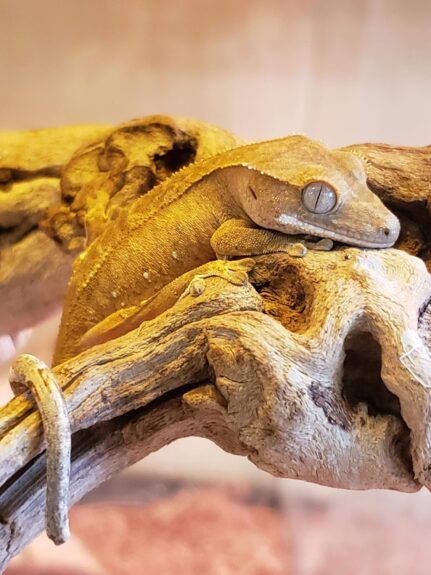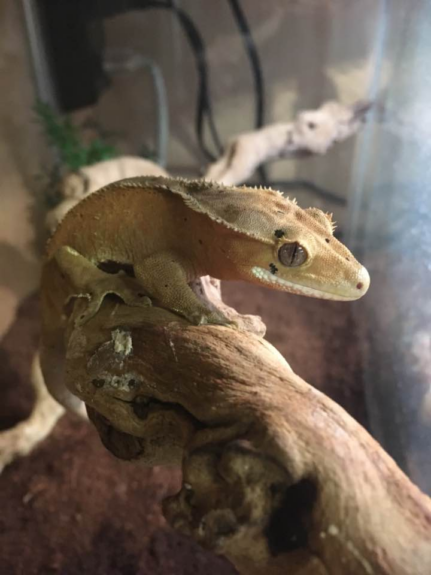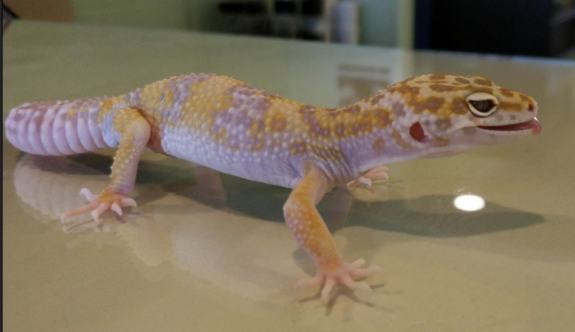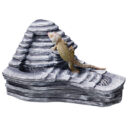Every forum has a section for newcomers, beginners, or “n00bs”. Usually these listings include threads with happy introductions, emergency health issues, and questions that seem to get repeated day after day, year after year. It’s important that we welcome new questions even when it’s difficult to find a way to respond in a patient, understanding way. So, today we’re going to be sharing some of those Frequently Asked Gecko Questions from our sister-site GeckoForums.net.

How much to feed? And how often?
There are many schools of thought on this. Our thinking is – whatever method you choose – be consistent. Consistent feeding gives you one extra thing to rule out if/when you have any issues with your gecko. Feed your gecko daily or every other day. Feed a few (2-3) prey items at once. If he finishes, then add a few more. Repeat until he stops feeding. Remove whatever is left, dead or alive. Repeat this daily or every other day until you have a solid idea of how much your gecko regularly eats. You can even keep a spreadsheet if it helps!
What’s this white stuff in the poop?
100% Totally normal and they’re called urates! Reptiles, like birds, have a single vent from which they expel both their wastes. Urates are what you might call reptile urine. Urates can make up some, none, or all of the waste expelled at any one time. They can even take on a slightly yellow hue. Don’t be alarmed when you see your gecko expel urates!
Should I be feeding something else? What about variety?

Variety is a good thing for your gecko for several reasons. One is that different prey items and food sources will provide your gecko with different vitamins and nutrients. Just like in humans, a varied diet is best for your gecko. Another good reason to change it up every once in a while is that this will ensure your gecko doesn’t become too picky. No one likes a picky eater – and what if you can’t find that one food your gecko insists on eating? Cut them off at the pass and change their food every few weeks at least. It’ll help you both in the long run.
Help! My gecko’s shed is stuck!
This one’s relatively easy. Hydrate your gecko. Review our article on Managing Water & Humidity. If you’re dealing with shed that has been stuck longer than a couple days, try a warm water soak followed up with a coconut oil massage. You’ll want to remove any stuck skin as soon as possible, then worry about maintaining an environment where next time nothing gets stuck. This will depend heavily on your regional weather so be sure to do your research! In all honesty, sometimes even well hydrated geckos can have trouble on occasion shedding their skin. Give them a day or two to “get it right” and then help them by pulling off what remains. You may need to use fingernails or tweezers for the hard to remove shed on the toes and near the eyes.
Help! My gecko isn’t eating!
Most of us are used to cats and dogs who are mammals that need to eat frequently, partly to give themselves the fuel they need to maintain their body temperatures. Geckos are cold blooded reptiles and don’t need food as frequently. They can survive a long time (days, weeks . . . )without eating. Many of them spend periods of the year not eating because of breeding, winter (colder weather and less light) or other reasons in those little gecko minds that we’ll never know. In general, if there’s a significant weight loss or a big change in behavior it’s time to consult the vet. Otherwise, the best advice is to keep offering food every other day and be patient. For additional feeding suggestions, check out our Gecko Time articles: My Gecko is not Eating: Why and How to Fix It and My Gecko Will Not Eat Part 2.
I thing there’s something wrong with my gecko!
Health related questions can be such a toughy because there can be a lot at risk! Of course, if your gecko is bleeding or worse please immediately take it to a veterinarian. If you’re troubleshooting minor issues at home though you’ll always want to brush up on your basic caresheet. I know, I know, temps are perfect, everything’s normal, nothing’s changed, we hear it a lot! But this isn’t the time for denial. It’s time for some sleuthing. Maybe the temps have changed, when did you last check? I don’t know about your house, but with a small family something has always changed. A change in the weather, a loud movie, even a visitor to your home; all of these things can stress out your gecko.
and the Grandaddy of them all: What morph is my gecko??
Most new gecko owners that ask this question really want to know what morph their gecko looks like. This is a little different from what a breeder wants to know, which is “what visible and non-visible genetic traits does the gecko have?” It’s extremely difficult to concretely tell what genetic morph your gecko may be without knowing anything about the visible and invisible genetic traits of its parents. This doesn’t mean it isn’t fun to guess or speculate about but it is something that comes up quite frequently and I often feel like people are disappointed with the usual response – “it’s beautiful, whatever it is”. In many cases, however, it’s possible for an experienced gecko keeper to tell you what morph your gecko looks like. If you’re buying geckos for genetics, make sure you ask about your gecko’s pedigree at the time of purchase!

These are some of the more common questions we see on the forums from new users but also new gecko keepers. Hopefully in covering some of the more frequently asked gecko questions we can save some newbs and ultimately also save some geckos from otherwise inevitable missteps.
What are some of the things that made you panic with your first gecko? Who did you turn to? How have things changed since then?



